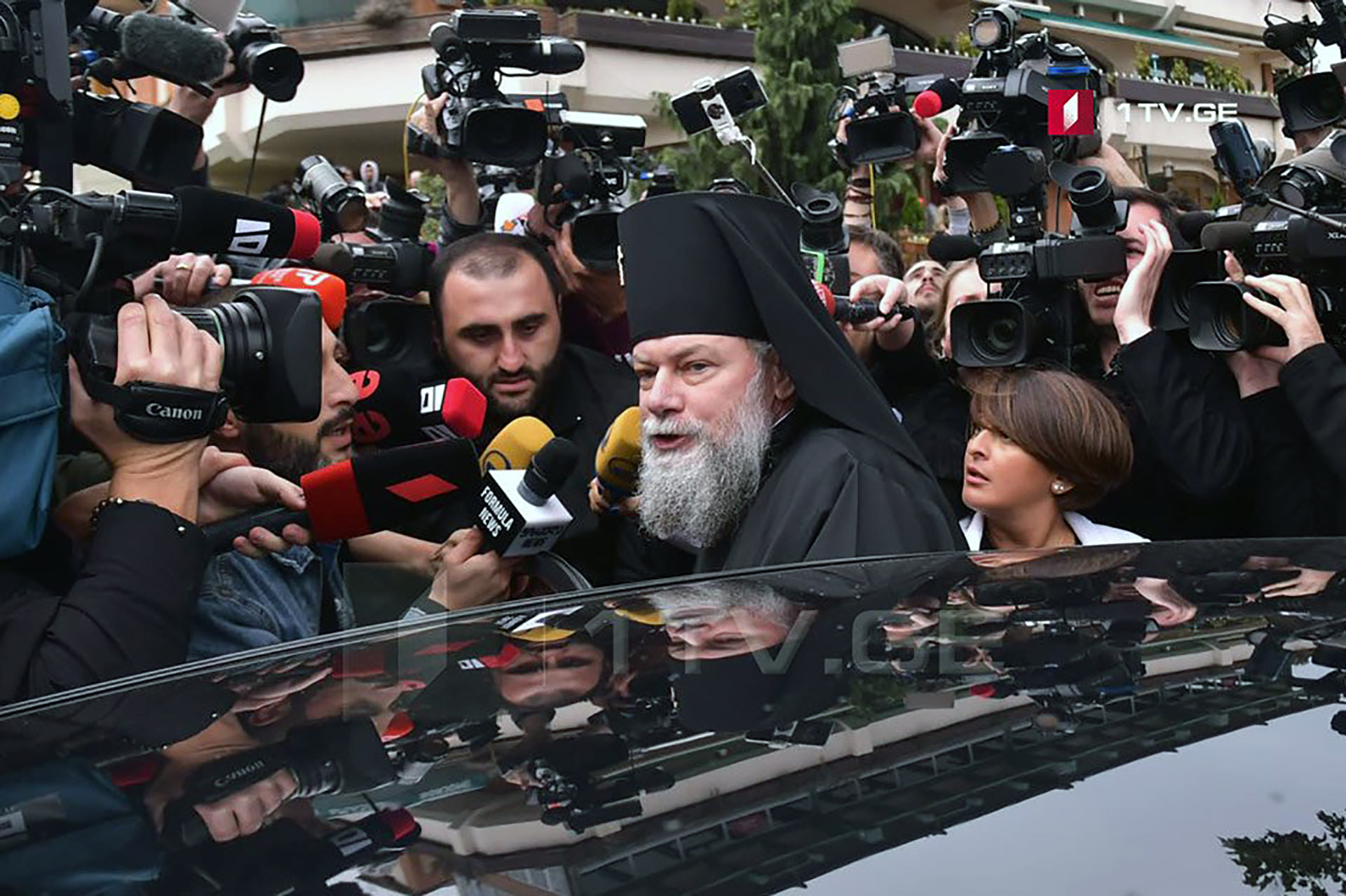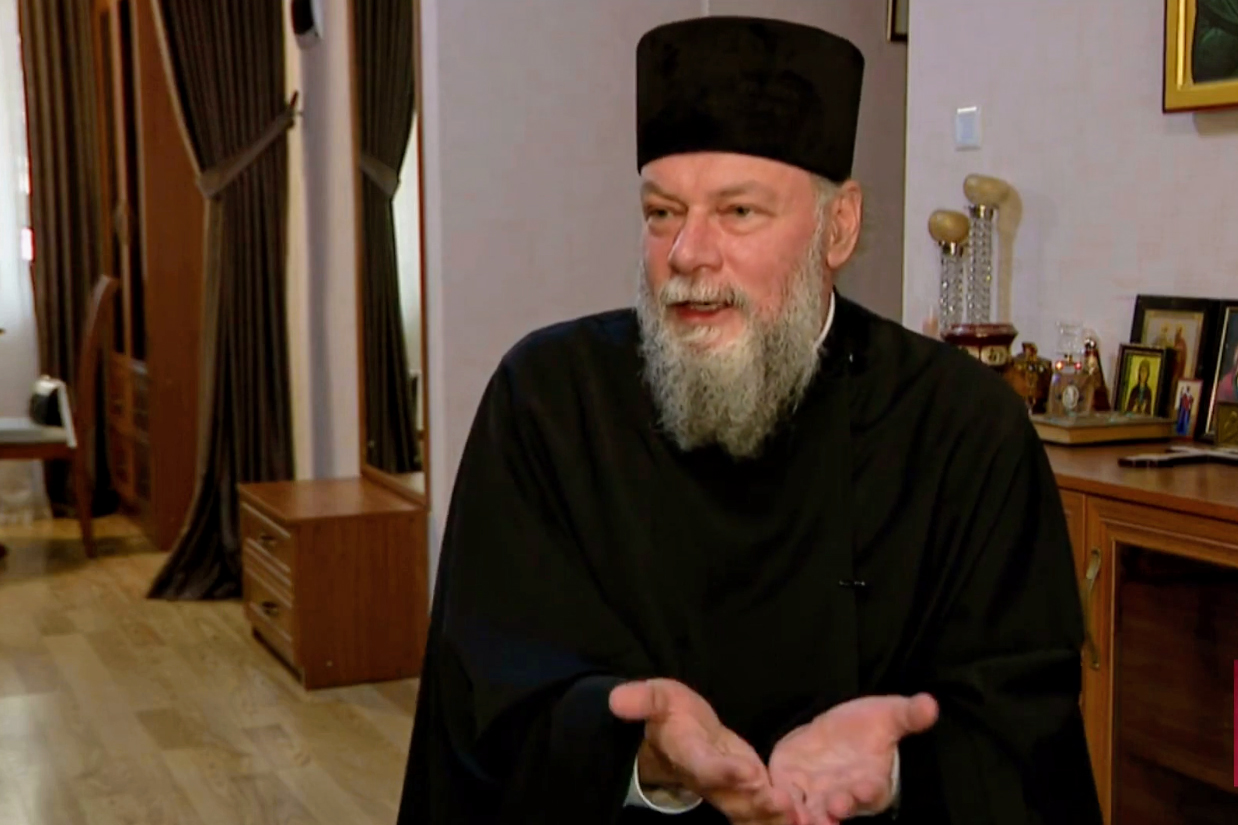

A high ranking member of the Georgian Orthodox Church has accused the head of the Church, Patriarch Ilia II, and other high ranking church officials of having sexual activity with men, including underage boys.
Archbishop Petre Tsaava, a member of the Church’s ruling body, the Holy Synod, made the accusations on 31 October following a Synod meeting.
‘The Chair of the [Holy] Synod personally stripped me of archpriesthood, which I think was unjust. The reason behind it was my exposing of the sin of sodomy in the Georgian Church’, Tsaava told journalists after he walking out of the meeting.
‘The nation has a Chair of the Synod beset by the sins of pederasty and sodomy’, Tsaava added, before departing from the Patriarchate, the administrative body of Church where the Synod meeting was held.
The term pederasty refers to a sexual relationship between an adult man and a pubescent or adolescent boy. The term is commonly used in many countries of the former Soviet Union, including Georgia, to pejoratively describe queer men in general.
After the meeting was over, another Synod member, Archbishop Nikoloz Pachuashvili of the Akhalkalaki and Kumurdo Diocese, told journalists that the meeting got so heated that some Synod members had to physically shield Ilia II.
He said they ‘had to escort Archpriest Petre out from the Synod meeting by force’.
Another Holy Synod member, Archbishop Stepane, stated that Tsaava screamed and wagged his finger in front of Ilia II during the meeting.

Other synod members maintained that Tsaava’s allegations were ‘unfounded’.
Talking to TV channel Rustavi 2 later that day, Tsaava said he had wanted to introduce witnesses of his allegations at the Synod meeting, including ‘victims [of the] sin of sodomy’. He said some of them had sought psychological therapy.
He did not give specific details of the allegations nor did he mention if he was referring to acts allegedly committed by Ilia II or by others.
He reiterated his position again in an interview with opposition-leaning TV channel Mtavari Arkhi.

‘Yes, I touched on this topic, the topic of pederasty. I apologise to viewers but a molester of a young man, a pederast, is a religious term, I can’t call it otherwise’.
Tsaava’s statement sent shockwaves through Georgia with many expressing surprise on social media not least due to the ambiguity of the allegations.
Soon after Tsaava’s first statement, Tamar Gamkrelidze, Hegumenia (abbess) of Saint Nino’s Monastery of Mothers in Martvili, doubled down, writing on Facebook that ‘the Patriarch has sacrificed the fate of the church to his own sodomy’.
‘It is tough to expose the Patriarch in the sin of sodomy. Father [Petre] had been trying to solve this problem within the Church for years, which unfortunately came to this result’, Gamkrelidze wrote.
Speaking to journalists after exiting the Synod meeting, Tsaava also said that the Holy Synod had decided to petition Georgian President Salome Zurabishvili to pardon Giorgi Mamaladze, the Georgian archpriest convicted of plotting the murder of the secretary of Ilia II, Shorena Tetruashvili.
[Read more on OC Media: Court upholds conviction of archpriest in church poison plot]
Cyanide scandal aftermath
Petre Tsaava has been the Archbishop of the Chkondidi Diocese, based in the west-Georgian towns of Martvili and Abasha, since 2007.
He became an outspoken critic of the Church leadership over alleged corruption and ‘moral sins’ after the 2017 cyanide scandal, for which archpriest Giorgi Mamaladze received a nine-year prison sentence.
Mamaladze was detained on 10 February 2017 after the authorities found sodium cyanide in his luggage as he was departing for a flight bound to Berlin, where Ilia II was undergoing surgery.
The court proceedings against Mamaladze were closed to the media and his lawyers were put under a gag order, barring them from speaking about the investigation publicly.
Tsaava supported Mamaladze’s claim from prison that he never intended to murder anyone, and that it was actually Tetruashvili who had asked him to purchase the cyanide.
Tsaava has maintained in recent years that Tetruashvili was the face of a ‘shadow government’ behind the ageing Ilia II, calling her a ‘Grey Cardinal’.
Both Mamaladze, through his letters from prison, and Tsaava in his statements, suggested several times publicly that unless the Synod helped to free Mamaladze, they would expose the ‘sin of homosexuality’ that was common among high ranking priests in the Georgian Orthodox Church.
Tsaava also earlier claimed that Mamaladze’s only wrongdoing was his plan to expose corruption under Archbishop Iakob Iakobishvili.
Iakobashvili himself had to resign as chorbishop, an advisory role to the Patriarch, after scandalously claiming that top government officials sought his help to remove Ilia II from his throne.
[Read more on OC Media: Georgian Orthodox archbishop accuses government of plotting to overthrow the Patriarch]
In an op-ed for Publika, theologian and religious commentator Mirian Gamrekelashvili noted that the Holy Synod meetings have been held irregularly in recent years, but that Ilia II could not postpone holding the latest convention after controversy over the Cyanide case resurfaced again.
On 28 October, TV channel Pirveli made Giorgi Mamaladze’s latest letter from prison public. In the letter, Mamaladze accused Deputy Chief Prosecutor of Georgia Mamuka Vasadze of attempting to pressure him into naming Ilia II’s nephew, Metropolitan Dimitri Shiolashvili, and the former head of the Patriarch’s security service, Soso Okhanashvili as co-conspirators to the plot.
Mamaladze insisted that the government had managed to ‘neutralise’ Shiolashvili as a candidate to replace Ilia II.
Talking to online newspaper Batumelebi, Gamrekelashvili said that Mamaladze could be subject to prosecution due to evidence he had obtained that compromised those ‘surrounding of the Patriarch’ and Mamaladze himself.
‘Unspeakable’, ‘a crime bigger than murder’, ‘a crime of a moral-ethical nature’ — is how Mamaladze allegedly referred to a secret he threatened to make public in an earlier letter he sent to several archbishops from prison in February.
Archbishop Stepane told journalists after the Synod meeting on 31 October that Petre Tsaava tried to ‘blackmail’ Ilia II and the Synod with a letter that Mamaladze had allegedly kept outside of Georgia.
‘The problem is not homosexuality’
Speaking to OC Media, one of the founders and organisers of Tbilisi Pride, Giorgi Tabagari, said that he found it problematic that homosexuality was being used to discredit an individual.
‘They have become victims of the politics of hate and violence that they themselves contributed to strengthening […] ongoing conflicts within the Church show us again what LGBT individuals in Georgia have to go through’.
Tabagari said he hoped the Church would learn from the scandal and stop stigmatising and oppressing individuals based on their sexual orientation and gender identity.
Referring to the allegations of sexual violence against minors, he said ‘this has nothing to do with gender or sexual orientation.’
‘Violence is violence and if there was a case of paedophilia in the Georgian Orthodox Church, it should be investigated.’
Queer rights group Equality Georgia said in a statement that both ‘the Patriarchate’s hostile position towards the LGBT community and statements about homosexuality of the Head of the Church could sound scandalous but this should not distract us from remembering that we live in a secular state where homosexuality is not a crime and especially not a sin’.
Petre Tsaava insisted in his interviews that traditional Georgian Orthodox ecclesiastical law against ‘sodomy’ was not applied by the Synod, something he found unacceptable.
Gigi Ugulava from the opposition European Georgia party commented on the story at a press briefing the same day.
‘The problem is not homosexuality but the fact that the Church persecuted members of this vulnerable group [queer people] going after them with taburetkas in the name of God.’
The taburetka (a type of stool) became a symbol of anti-queer violence by clerics after a priest who chased queer rights activists on 17 May 2013 held a stool in his hands.
Irma Inashvili, head of the conservative opposition Alliance of Patriots parliamentary group, called for Petre Tsaava to be punished.
Inashvili accused Tsaava of being connected with liberal opposition groups including opposition parties the United National Movement and European Georgia, which she said sought to ‘destroy the Church’s authority’.
‘Petre should be careful, we’ll smash his face if he continues this way’, she said during a live broadcast on Rustavi 2 on 31 October.
Georgian Prime Minister Giorgi Gakharia condemned the comments Tsaava’s comments as ‘an attack on the Patriarch of Georgia’.
‘Those unable to control their ego put our present and future at great risk. This is absolutely unacceptable and I am sure every [Georgian] citizen will stand by the side of our patriarch today’, he said in a statement on Facebook.









